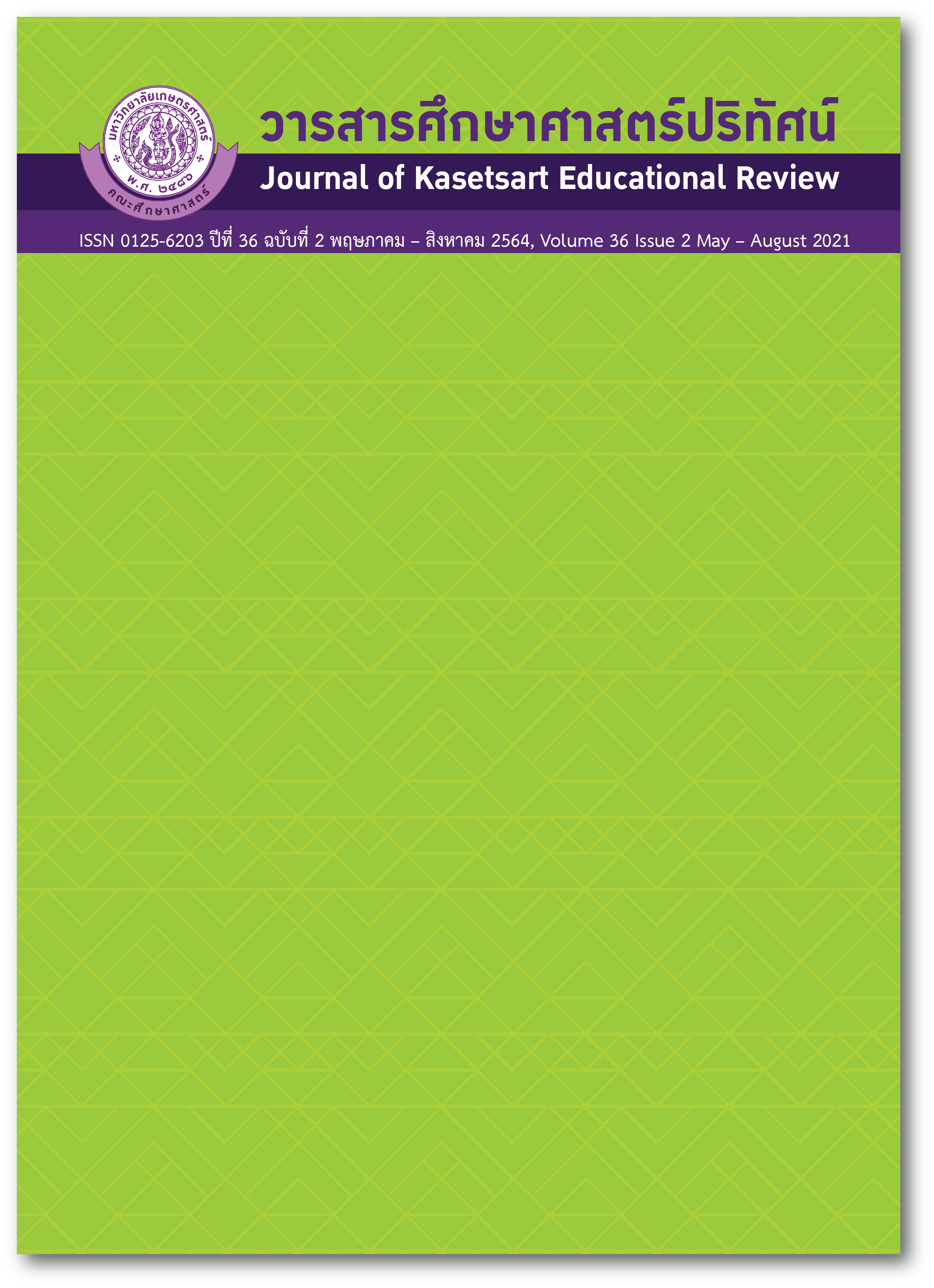ผลการจัดการเรียนรู้โดยใช้ปัญหาเป็นฐานที่มีต่อผลสัมฤทธิ์ทางการเรียนวิชาวิทยาศาสตร์ เรื่อง แรงและการเคลื่อนที่ และความสามารถในการคิดแก้ปัญหาทางวิทยาศาสตร์ของนักเรียนชั้นมัธยมศึกษาปีที่ 2 โรงเรียนพระมารดานิจจานุเคราะห์ กรุงเทพมหานคร
The Effects of Problem-based Learning Management on Science Learning Achievement in the Topic of Force and Movement and Science Problem-solving Thinking Ability of Mathayom Suksa II Students at Phra manda Nijjanukroh School in Bangkok Metropolis
คำสำคัญ:
การจัดการเรียนรู้โดยใช้ปัญหาเป็นฐาน, ผลสัมฤทธิ์ทางการเรียน, ความสามารถในการคิดแก้ปัญหา ทางวิทยาศาสตร์บทคัดย่อ
การวิจัยครั้งนี้มีจุดประสงค์เพื่อ 1) เปรียบเทียบผลสัมฤทธิ์ทางการเรียนหลังเรียนรายวิชาวิทยาศาสตร์ หน่วยการเรียนรู้เรื่อง แรงและการเคลื่อนที่ ของนักเรียนชั้นมัธยมศึกษาปีที่ 2 ระหว่างกลุ่มที่เรียนด้วยการจัดการเรียนรู้โดยใช้ปัญหาเป็นฐานกับกลุ่มที่เรียนโดยใช้การจัดการเรียนรู้แบบปกติ 2) เปรียบเทียบความสามารถในการคิดแก้ปัญหาทางวิทยาศาสตร์หลังเรียน ของนักเรียนชั้นมัธยมศึกษาปีที่ 2 ระหว่างกลุ่มที่เรียนด้วยการจัดการเรียนรู้โดยใช้ปัญหาเป็นฐานกับกลุ่มที่เรียนโดยใช้การจัดการเรียนรู้แบบปกติ และ 3) เปรียบเทียบความสามารถในการคิดแก้ปัญหาทางวิทยาศาสตร์ของนักเรียนชั้นมัธยมศึกษาปีที่ 2 ที่เรียนด้วยการจัดการเรียนรู้โดยใช้ปัญหาเป็นฐานระหว่างก่อนเรียนและหลังเรียน
กลุ่มตัวอย่างที่ใช้ในการวิจัยครั้งนี้ เป็นนักเรียนชั้นมัธยมศึกษาปีที่ 2 โรงเรียนพระมารดานิจจานุเคราะห์ ภาคเรียนที่ 1 ปีการศึกษา 2562 จำนวน 176 คน 2 ห้องเรียน ห้องเรียนละ 36 คน ได้มาโดยการสุ่มแบบกลุ่ม แล้วจับสลากให้กลุ่มหนึ่งเป็นกลุ่มทดลอง และอีกกลุ่มหนึ่งเป็นกลุ่มควบคุม เครื่องมือวิจัยที่ใช้ ได้แก่ 1) แผนการจัดการเรียนรู้โดยใช้ปัญหาเป็นฐาน เรื่อง แรงและการเคลื่อนที่ 2) แบบทดสอบวัดผลสัมฤทธิ์ทางการเรียนวิชาวิทยาศาสตร์ หน่วยการเรียนรู้เรื่อง แรงและการเคลื่อนที่ และ 3) แบบวัดความสามารถในการคิดแก้ปัญหาทางวิทยาศาสตร์ สถิติที่ใช้ในการวิเคราะห์ข้อมูล ได้แก่ ร้อยละ ค่าเฉลี่ย ส่วนเบี่ยงเบนมาตรฐานและ การทดสอบค่าที
ผลการวิจัยพบว่า 1) ผลสัมฤทธิ์ทางการเรียนรายวิชาวิทยาศาสตร์ หน่วยการเรียนรู้เรื่อง แรงและการเคลื่อนที่ของนักเรียนชั้นมัธยมศึกษาปีที่ 2 หลังเรียนด้วยการจัดการเรียนรู้โดยใช้ปัญหาเป็นฐานสูงกว่านักเรียนที่เรียนด้วยการจัดการเรียนรู้แบบปกติอย่างมีนัยสำคัญทางสถิติที่ระดับ .05 2) ความสามารถในการคิดแก้ปัญหาทางวิทยาศาสตร์ของนักเรียนชั้นมัธยมศึกษาปีที่ 2 หลังเรียนด้วยการจัดการเรียนรู้โดยใช้ปัญหาเป็นฐานสูงกว่านักเรียนที่เรียนด้วยการเรียนรู้แบบปกติอย่างมีนัยสำคัญทางสถิติที่ระดับ .05 และ 3) ความสามารถในการคิดแก้ปัญหาทางวิทยาศาสตร์ของนักเรียนชั้นมัธยมศึกษาปีที่ 2 ที่เรียนด้วยการจัดการเรียนรู้โดยใช้ปัญหาเป็นฐานหลังเรียนสูงกว่าก่อนเรียนอย่างมีนัยสำคัญทางสถิติที่ระดับ .05
เอกสารอ้างอิง
Lintaratanasirikun, K., et al. (2017). The research report of Synthesis of research in teaching and learning mathematics in the secondary level. Nonthaburi: Faculty of Education. [in Thai].
Ministry of Education, (2008). Approach plan of development potential in the project to develop the potential of Thai children. Bangkok: Office of Educational Research and Improvement. [in Thai].
Namdech, N. (2015). Comparison of academic achievement and problem-solving ability Science about force and motion Science Learning Substance, Grade 9, between problem - based learning activities (PBL) and normal learning activities. Master of Education Thesis. Chaiyaphum: Chaiyaphum Rajabhat University. [in Thai].
National Institute of Educational Testing Service (Public Organization). (2018). Report on the results of the test the national level basic O-Net Matthayom 3 Year 2559-2561. Retrieved April 10, 2018, from http://www.nite.or.th. (in Thai)
Nuangchalerm, P. (2015). Trends in science learning in the 21st century. Journal of Learning and Teaching. Rangsit university. 9(1), 136 – 154. [in Thai].
Phanij, W. (2012). Ways to create learning for students in the 21st century. Bangkok: Sodsri-Saridwongso Foundation. [in Thai].
Phatthana, N, Choawakeerati, N. and Jindanurak, T. (2019). The effect of stem educational model on learning achievement in chemistry on organic chemistry and scientific creativity of grade 12 in Pak Chong School Nakhon Ratchasima province. STOU Education Journal, 12(2), 120. [in Thai].
Pitiporntapin, S. (2015). Management of Science and Society in the 21st Century. Bangkok: Neva Education Limited Publisher:
Saiyot, L., A. (2000). Psychometric measurement. Bangkok: Surivisan. [in Thai].
Tachaiwong, Ph. (2020). The development of learning object lessons via the internet through teaching Searching for knowledge Science subject in various systems in the human body. For Grade 8 students in schools under Office of Secondary Educational Service Area 35. STOU Education Journal, 13(1), 32. [in Thai].
Tangnoi Ph. (2017). Study of the ability to solve scientific problems Based on science knowledge about atmosphere and weather of grade 7 students. Journal of Education. 11(12), 151 – 152. [in Thai].
Thambut, M. (2002). Learning quality development using PBL (Problem-Based Learning). Academic Journal of Science in periscope management, 4 (4), 80-86. [in Thai].
The institute for the Promotion of Teaching Science and Technology (IPST). (2018). Programme for International Student Assessment. Bangkok: Seven Printing Group. [in Thai].
Thongchai, A. (2012). Science, Technology, Engineering and Mathematics and Educational Management in the 21st Century. Journal of Science, Mathematics and Technology Teacher. 18, 78 – 80. [in Thai].
Thorndike, Edward L. (1966) Human learning. Cambridge, Mass. : M.I.T. Press.
Torp, L., & Sage, S. (1998). Problem as possibilities: Problem-based learning for K-12. Alexandria, Virginia: Association for Supervision and Curriculum Development.
Vygotsky, L. S. (1997). Education Psychology. Boca Raton : St. Lucie.
Weir. (1974). Problem Solving is Everybody is Problem. The Science Teacher.
ดาวน์โหลด
เผยแพร่แล้ว
ฉบับ
ประเภทบทความ
สัญญาอนุญาต
บทความทุกบทความเป็นลิขสิทธิ์ของวารสารคณะศึกษาศาสตร์ มหาวิทยาลัยเกษตรศาสตร์ วิทยาเขตบางเขน
วารสารศึกษาศาสตร์ปริทัศน์ (Kasetsart Educational Review)






